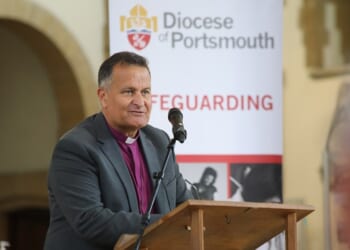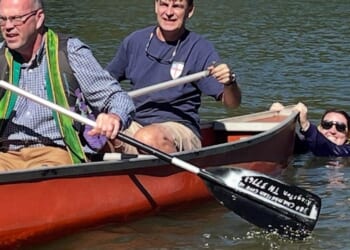THE 80th anniversary of VJ — Victory over Japan — Day was commemorated at the National Memorial Arboretum in Staffordshire, on Friday. Veterans, many of them centenarians, were joined by the King, the Queen, and the Prime Minister.
The band of the Royal Marines, playing Captain General, marched in formation before sergeants descended the steps of the memorial to set up a drumhead altar with Royal British Legion and Union flags.
The King and Queen were greeted with the National Anthem, and placed wreaths and flowers, as did Sir Keir Starmer. A wreath was also laid at the Burma Railway memorial, in memory of prisoners-of-war, and created from a 30-metre length of the railway track that they were forced to construct.
“The Last Post” was sounded; there was a Red Arrows fly-past; and then two minutes’ silence was kept before the ceremony continued.
Owen Filer, 105, who had mainly served in Bombay, recited from memory the Kohima Epitaph: “When you go home, tell them of us and say, for your tomorrow, we gave our today.”
Ruby Turner sang “I’ll Be Seeing You”, a song recorded by Bing Crosby in 1944; and Celia Imrie read an account of VJ Day, giving thanks for all those who had served and lost their lives in the Far East.
Three veterans, Trevor Taylor (Royal Air Force), John Shay (Royal Navy), and Richard Pelzer (British Army), spoke of their memories.
Mr Taylor had contracted clinical malaria, and had been flown in a one-seater plane, with room for a stretcher on the back, to a mobile field hospital. “They cleaned me up to get me ready again for going back,” he said.
The kamikaze pilots had been the main threat to our warships, Mr Shay recalled: “You just rode your luck while you could. And that’s what we did.”
“Fear was put at one side,” Mr Pelzer said.
“When the war in Europe was finished, people were so overjoyed after six years of war that they took for granted that everything was hunky-dory — and it wasn’t of course, especially for us out there,” Mr Shay continued.
“The war in the Far East was, I think, the forgotten war. We were starved of everything,” Mr Pelzer said. He read out a poem that he had composed.
Nitin Ganatra read out the recollections of Colonel Mohammad Ghani Rashdi, 104, who had served in the Indian Army: “My prayers were the only thing that kept me going. I used to pray every day to leave. Everyone did. We all prayed to a different God, but we all prayed for the same thing: freedom.”
Barbara Sowerby and Olga Henderson, who had been civilians held by the Japanese, spoke about their experience in an internment camp. Archive footage from wartime Burma was played, and Thomas Jones (British Army), Joseph Hammond (Royal West African Frontier Force), and Bernard Francis Madden (British Army) recounted their experiences.
Captain Yavar Abbas, who had served in the 11th Sikh Regiment of the Indian Army, apologised for “going off-script” before he thanked the King for attending the service and wished him well for his cancer treatment, something that he, too, had endured. The King and Queen looked visibly touched by this remark. Mr Abbas then read an extract from his diary, while Jasdeep Singh Degun played Raag Ahiri.
A tribute was paid to the Commonwealth soldiers who had served in the Pacific War: “the most diverse fighting force in history”. Sir Ben Okri read from “Burma, 1945 Sacrifice”: “To fight the white man’s war, they did not know they were fighting to save the whole wide world.”
Robert Lindsay read the recollections of the Chindits in the Burmese jungle, featuring accounts of the soldiers Sid Machin and Charlie Richards. John Harlow, another veteran, shed tears when a tribute was read out on his behalf by Anton Lesser.
The skirl of bagpipes was heard, as well as the singing of the National Children’s Choir of Great Britain. During a violin piece, dancers took to the stage while others moved among them, carrying long sticks with white paper birds that fluttered in the air.
Another veteran, George Durrant, said that coming generations must remember the veterans’ sacrifices, “so that they can strive for a more peaceful tomorrow”.
As the ceremony drew to a close, there was a fly-past by a Lancaster, flanked by a Hurricane and Spitfire. The King and Queen met veterans and their families before leaving.
Across the UK, other services marked the anniversary. Cathedrals were among those places where the two-minute silence was observed at noon.
For a service of thanksgiving and remembrance in Norwich Cathedral, a parade moved through the Cathedral Close, and a Dakota aircraft flew past. The cathedral Precentor, Canon Aidan Platten, who had overseen the planning of the service, said that it had been a “real privilege”.
Before the service, he had explained: “We will remember those who lost their lives in service of our nation and in the cause of peace. We will remember and hear the words of those who suffered the horrors of imprisonment, and in these dangerous and uncertain days, we will commit ourselves to strive for peace.”
The Rt Revd Peter Eagles, a former Archdeacon for the Army, preached the sermon.















